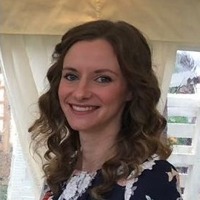
Sarah Bartram
Clinical Scientist (Radiotherapy Physics) at South Tees Hospitals NHS Foundation Trust
Every day I will be working on something different!
About Sarah...
Who am I?
"My personality types are communicator, quality controller and trainer. I think that these types are a good fit to my character - the quiz has correctly identified my key character traits - and these personality types link with my job role. For example, my job involves working with lots of different staff groups and often we can be discussing quite complex technical information. As such, it is important that I have good communication skills to make sure everyone understands and can work together as a team. My role is about introducing new techniques and facilitating the routine treatment of patients therefore I need to think like a quality controller to ensure that everything is done correctly and safely. My final personality type is trainer, which strongly links with my role in the health sector as I am keen to help colleagues and support them so we can all achieve our department goal of providing patients with the best treatment for their cancer. "
What do I do?
"I work as a healthcare scientist, specialising in radiotherapy physics. Radiotherapy is the medical term for treating people who have cancer using radiation. My role as a scientist working in radiotherapy is to provide specialist scientific support to the radiotherapy service and to bring new technology and new techniques into routine use for our patients. What I enjoy most about my job is that every day I will be working on something different, perhaps project work, perhaps resolving a problem that has come up, and it is all focused on trying to give patients the best treatment. I am really proud that I am able to use my science qualifications and experience to help people. When you start training to do my job, the starting salary is now ~ £30,000. When you complete your training and achieve professional registration this increases to ~ £38,000. (Salaries correct for April 2020)."
How did I get here?
"My career route probably began to take shape when I chose my A-levels (maths, physics, chemistry and german) because I needed the maths and physics to go on to study physics at university. I spent 4 years at Durham University gaining my MPhys, where quite a lot of my courses were about astronomy and space. Whilst I enjoyed learning about space I knew that for me, and my personality type, I wanted to do a job where I was able to use my physics degree to help people as that has always been something which is important to me. I heard about healthcare science in my 4th year of university and applied to the NHS healthcare science graduate training scheme. I was fortunate to pass the interviews on my first attempt and began the training programme after I finished university. Over the 3 years as a trainee healthcare scientist in medical physics I worked in lots of different hospitals across the North East and tried a variety of medical physics specialties. Towards the end of the scheme I chose to specialise my training in radiotherapy physics. After completing the training scheme and associated MSc I gained a post as a clinical scientist (radiotherapy physics) at The James Cook University Hospital in Middlesbrough and have been there ever since! "
The life I live
"I think it is fair to say that in my spare time I like to be busy! I've always got a list of things to do and people to catch up with. I'm quite a list-based person (probably the organisational parts of my quality controller and trainer personality types shining through!) so am working on a list of books I want to read (BBC top 100 books) and list of films to watch (top 30 from IMDB's top 250 films). I don't spend all of my time sitting down though because I also like gardening (currently trying to grow some vegetables), walking the dog and the occasional run to keep fit. I've recently had a couple of knitting projects on the go and have been enjoying playing a few board games with friends. There is always so much to see and do that I am never bored! "
My typical day
"As I have said previously, my job is quite varied and I am often doing different things each day. In an \"average\" week I might spend one day working on a treatment machine or a scanner - this involves performing tests to ensure it is working correctly and safely. The other days I will spend doing a combination of project work and routine work. Project work might involve making measurements with some new equipment, using spreadsheets or computer code to analyse data and then writing a report. Projects typically last for several months and you work on them a little each week, sometimes with colleagues, sometimes on your own. Routine work might involve carrying an on-call phone, where you respond to problems/issues that crop up in the department, or it might involve using bespoke equipment/software to plan and calculate radiation doses to patients or to measure patient doses. As with most jobs, I do spend some time each week checking emails, reading updates from my employer, attending group meetings, etc. I would say that 90% of my job is desk/computer-based and 10% involves working elsewhere e.g. on treatment machines/scanners. "
My qualifications
"A-levels: Maths, Physics, Chemistry and German. Undergraduate degree: MPhys (Physics)Postgraduate qualifications: MSc in Clinical Science (Medical Physics: Radiotherapy Physics); currently completing MSc in Management Practice (you don't stop learning!)"



